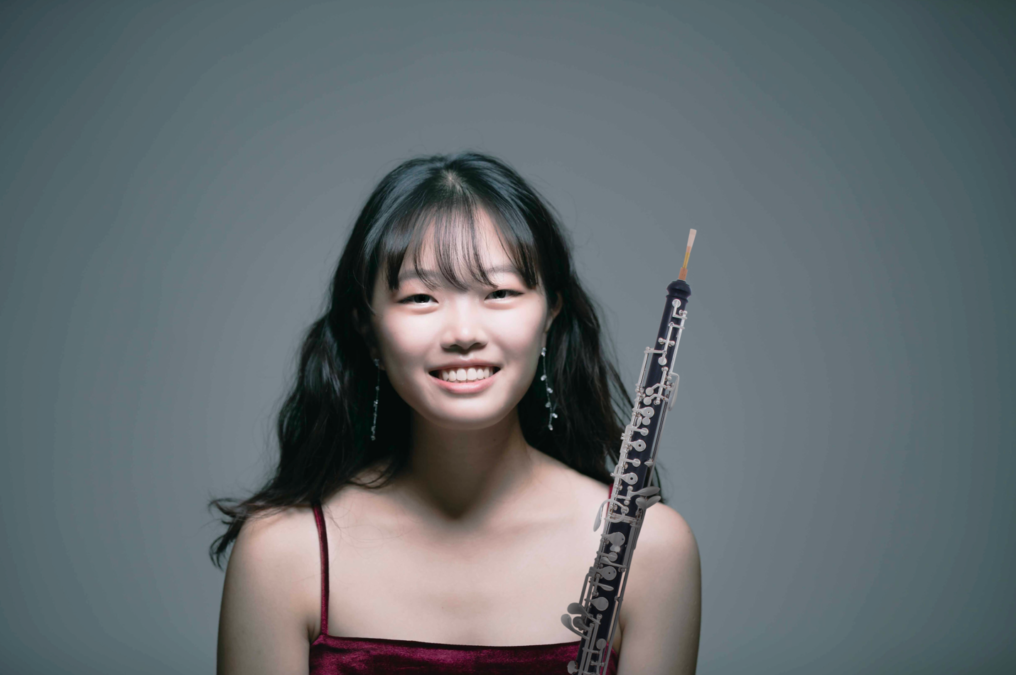April 19, 2023

Recently, FMMC’s Student Activities Chair Christine Kharazian interviewed Student Oboist Yunah Kwon:
1. How did you select the oboe, or did the oboe select you?
When I moved to the U.S. from South Korea in 4th grade, I really wanted to join the band or orchestra to make friends. Conveniently, around the same time, our elementary school invited musicians from the Navy Band to come and demonstrate their instruments. The oboist played some quick excerpts for us, one of them being Hedwig’s Theme by John Williams. As a huge Potterhead, I was convinced that the oboe was destined for me. I also wanted to challenge myself by playing the “hardest instrument,” according to my band director. Soon enough, my oboe journey began with a plastic Yamaha oboe rental from a local music store. Looking back, even if I had chosen another instrument, I like to think that I would’ve continued to pursue music just as deeply as I did with oboe.
2. Do you have a teacher that inspired you in a special way?
My private instructor, Katherine Needleman, never fails to inspire me as an oboist and a musician. Every time I hear her play, it makes me think, “so that’s what oboe is supposed to sound like!” Her sweet tone and control are unmatched; I haven’t yet met an oboist with the same caliber of tone and technique as her. We always run out of lesson time because she has so many musical insights to share with me. She throws music theory, history knowledge, and phrasing ideas as they come to her, and then it’s up to me to pick up the pieces and apply them. Ms. Neeedleman is also a strong advocate for playing works by living underrepresented composers and promoting gender equality in classical music. Outside of just playing my instrument well, she has taught me the importance of being a socially conscious artist in the modern world; a lesson that I think is crucial for my generation of musicians in shaping the future of our art form.
3. I learned that you volunteer for the Do Re Mi Project. Please tell us more.
The Do Re Mi Project is a student-founded nonprofit that promotes music equity by connecting high school tutors to kids for free online music lessons. Amy, a flutist in my youth orchestra, founded the organization and asked me to tutor piano for Do Re Mi. During quarantine, I started tutoring piano to more and more students since I wanted an outlet to continue sharing my passion for music. At one point over the summer, I had thirteen students whom I tutored weekly. Eventually, I started organizing events for Do Re Mi tutors as well, such as nursing home recitals and online masterclasses. I find volunteering for Do Re Mi meaningful because, unfortunately, classical music is still an elitist art that requires years of expensive lessons and exclusive enrichment opportunities. By making music education more accessible through free tutoring and open masterclasses, the Do Re Mi Project closes the gap between passionate musicians and high-level instruction.
4. What is your proudest musical accomplishment?
My proudest accomplishment is learning how to play the clarinet. Although I’ve been interested in the French horn, cello, and guitar, I had never once in my life wanted to play the clarinet until our school required students in the top band to enroll in the marching band. Since the oboe isn’t a marching band instrument (double reeds are too delicate), I decided to take up the clarinet during my sophomore year because it was the most practical woodwind marching instrument for me to learn. With the help of YouTube tutorials, online fingering charts, and mini lessons with my clarinet friends, I taught myself how to play the instrument grudgingly.
Although there are similarities in fingering and air control, the clarinet uses a single lip embouchure, meaning your bottom teeth are in contact with the mouthpiece. In comparison, the oboe uses a double lip embouchure, where your lips cover your teeth on both sides of the reed. I didn’t want to mess up my embouchure for oboe, so I had to learn how to play the clarinet with an extra unconventional double lip embouchure. All in all, I don’t regret learning the clarinet—it led me to befriend clarinet section members and even appreciate the instrument’s appeal—but having played both instruments, I can proudly confirm that the oboe is, in fact, the superior instrument.
5. Can you say a few words about your FMMC experience? Any message for our young members?
I really enjoyed performing at the Strathmore Mansion for the FMMC community! Practicing music at home can feel detaching at times, so I appreciate the opportunity to share my musical ideas with a live audience. Afterall, the point of being a musician is to share your music.
My favorite part about the classical music community is how tight knit it is. At the recital, I befriended other student musicians from Maryland—a flutist, clarinetist, and pianist—and sure enough, ended up running into the pianist later at my youth orchestra rehearsal. So, my message for young members would be to take full advantage of the performance and social opportunities you are given. You never know which musician you’ll run into next!